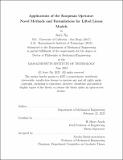Applications of the Koopman Operator: Novel Methods and Formulations for Lifted Linear Models
Author(s)
Ng, Jerry
DownloadThesis PDF (4.851Mb)
Advisor
Asada, H. Harry
Terms of use
Metadata
Show full item recordAbstract
The analysis and control of nonlinear dynamic systems is an active research field due to the ubiquity of nonlinear systems in the physical world. However, the handling of these systems is significantly more difficult than the handling of their linear counterparts, for which a host of methods and techniques are available. It has been shown that through the use of the Koopman Operator, these nonlinear systems can be lifted to a higher order state space, and with this lifted representation, the system's dynamics behave linearly.
In this thesis, we explore the use of existing methods for constructing the Koopman Operator on unexplored classes of nonlinear systems, such as systems with segmented dynamics and exogenous inputs. Unlike when modeling these systems with a hybrid or switched framework, the lifted linear models based on the Koopman Operator allow for easy application of model predictive control.
We then discuss the methods for constructing the Koopman Operator. Specifically, we alleviate the pitfalls of current data-driven methods for construction of the Koopman Operator through the use of a data-driven formulation of Direct Encoding, which is based on integration. This differs significantly from the state of the art.
Lastly, the use of Koopman with relation to deep learning is considered. Through utilizing the aforementioned data-driven method, improvements to standard applications of Deep Koopman are demonstrated. In addition, we demonstrate a novel training method that is enabled by Direct Encoding. Through the use of this method, we are able to accurately model the stable subspace of a system containing both stable and unstable subspaces, unlike with standard Deep Koopman methods. It is shown that the resultant model can be used to estimate the borders between subspaces.
Date issued
2023-06Department
Massachusetts Institute of Technology. Department of Mechanical EngineeringPublisher
Massachusetts Institute of Technology